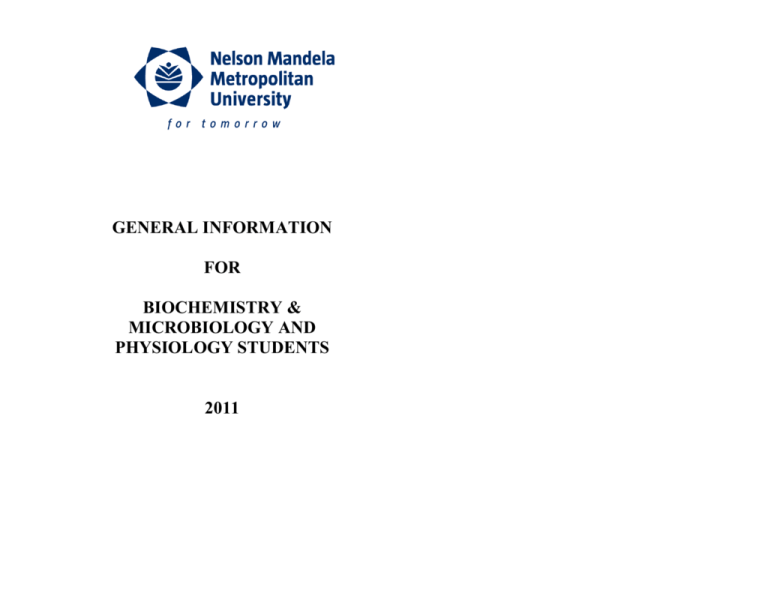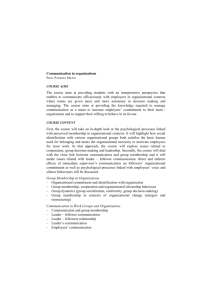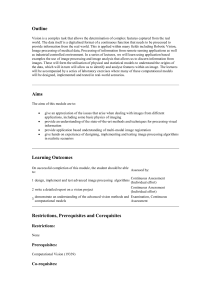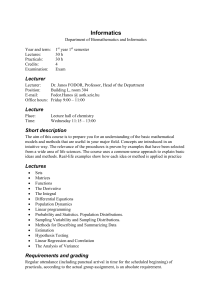Dr BM Somai - Department of Biochemistry and Microbiology
advertisement

GENERAL INFORMATION FOR BIOCHEMISTRY & MICROBIOLOGY AND PHYSIOLOGY STUDENTS 2011 Table of Contents 1. 2. 3. Objectives of the Department of Biochemistry & Microbiology Staff Undergraduate studies 3.1 Second-year modules 3.2 Third-year modules 3.3 Prescribed Books 3.4 Language 3.5 Consultation 3.6 Practicals 3.7 Class Attendance 3.8 Tests 3.9 Absence from Tests or Exams 3.10 Copying and Plagiarism 3.11 Mark Allocation 3.12 Duly Performed (DP) Certificates Welcome to the Department of Biochemistry & Microbiology. We hope you will have a good year with us and that you will achieve your academic goals. This booklet contains the information you will need to organise your studies for the year. 1. Objectives of the Department The Department of Biochemistry & Microbiology is committed to guide you in the acquisition of scientific skills and insights. We are committed to excellence in academic achievement and purposeful research. We aim to assist you to develop: An understanding of concepts and principles as well as acquired knowledge in science – particularly Biochemistry & Microbiology; The ability to use scientific knowledge and skills to solve problems in innovative ways, using appropriate principles, tools, techniques, methodology and logical reasoning; Skills used to investigate phenomena related to Biochemistry, Microbiology and science and to understand the changing and contested nature of knowledge in science; The ability to use oral and written modes of communication through the effective preparation, organisation and presentation of research; The ability to use science and technology effectively, critically and safely, while showing responsibility to the environment and the health of others; An understanding of the world through integration of knowledge and skills; The ability to transfer knowledge across contexts; 2. The ability to work effectively in a team, collaborating to develop commitment, respect, shared responsibility, interpersonal relationships and managerial skills in order to achieve a set purpose. Staff At university, you are a student and not a pupil. The academic staff is there to assist you but you are a partner in your own education and not a reluctant bystander. The success of your studies depends on your contribution and not on authoritarian discipline. Mutual respect and cooperation between students and lecturers will result in effective education. Try to be considerate of lecturers and other students. This will result in a good working system. The staff with whom you will interact are: Prof V Oosthuizen Professor: Biochemistry Head of Department Office: 12 0307 Tel: 504 2435 Email: vaughan.oosthuizen@nmmu.ac.za Ms L Smith Departmental Secretary Office: 12 0306 Tel: 504 2441 Fax: 504 2814 Email: lourine.smith@nmmu.ac.za Dr V Oosthuizen Senior Lecturer: Biochemistry Office: 12 0301 Tel: 504 2435 Email: vaughan.oosthuizen@nmmu.ac.za Dr M van de Venter Lecturer: Biochemistry Office: 12 0330 Tel: 504 2813 Email: maryna.vandeventer@nmmu.ac.za Dr CL Frost Senior Lecturer: Biochemistry Office: 12 0327 Tel: 504 4123 Email: carminita.frost@nmmu.ac.za Dr BM Somai Senior Lecturer: Microbiology Office: 12 0205 Tel: 504 2608 Email: benesh.somai@nmmu.ac.za Dr TG Downing Lecturer: Microbiology Office: 12 0201 Tel: 504 2359 Email: tim.downing@nmmu.ac.za Ms S Govender Lecturer: Microbiology Office: 12 0206 Tel: 504 2347 Email: sharlene.govender@nmmu.ac.za Dr S Roux Senior Lecturer: Physiology Office: 12 0303 Tel: 504 2132 Email: saartjie.roux@nmmu.ac.za Mr S. Rayise Technician: Physiology Office: 12 0331 Tel: 504 2443 Email: Samuel.rayise@nmmu.ac.za Mr R van den Bergh Senior Technician: Biochemistry Office: 12 0328 Tel: 504 2237 Email: ryno.vandenbergh@nmmu.ac.za 3. Mrs A Erasmus Technician: Biochemistry/Microbiology Office: 12 0330 Tel: 504 4070 Email: anna.erasmus@nmmu.ac.za Undergraduate studies Term dates: Term 1: 14 February – 1 April Term 2: 04 April – 31 May Term 3: 25 July – 13 September Term 4: 14 September – 04 November Exams (Terms 1 & 2): 28 May – 15 June Exams (Terms 3 & 4): 9 November – 29 November Mrs W Wilde Technician: Microbiology Office: 12 0231 Tel: 504 2351 Email: wendy.wilde@nmmu.ac.za 3.1 Second year Modules Biochemistry Mrs M Fensham Technician: Physiology Office: 12 0204 Tel: 504 2654 Email: megan.fensham@nmmu.ac.za Content: Foundations of Biochemistry, water, amino acids, peptides and proteins, 3D structure of proteins, protein function, enzymes. Lecturers: Prof Oosthuizen Lectures: 35 Practicals: 10 Examination Period: 28 May –15 June Examination hours: 2 Credits: 10 Mr S Pambuka Technician: Biochemistry Office: 12 0330 Tel: 504 2237 Email: simthembile.pambuka@nmmu.ac.za BC 211 – Introductory Biochemistry BC 221 – Immunology Content: Cells and organs of the immune system, innate and acquired immunity, antigens and antibodies, antibody gene organisation, B-cell receptor, T-cell receptor, MHC and co-receptor proteins, antigen presentation, cytokines, B and T cell biology, complement, immune diseases, immunological techniques. Lecturer: Dr G Dealtry Lectures: 35 Practicals: 10 Examination Period: 28 May – 15 June Examination Hours: 2 Credits: 10 BC 231 – Carbohydrate Metabolism Content: Carbohydrates and glycobiology, bioenergetics, glycolysis, gluconeogenesis, pentose phosphate pathway, glycogen metabolism, principles of metabolic regulation, citric acid cycle, carbohydrate biosynthesis in plants and bacteria. Lecturers: TBC Lectures: 35 Practicals: 10 Examination Period: 9 November – 29 November Examination Hours: 2 Credits: 10 BC 241 – Lipid Metabolism Content: Lipids, membrane structure, fatty acid catabolism, lipid biosynthesis, oxidative phosphorylation, photophosphorylation. Lecturer: Prof M van de Venter Lectures: 35 Practicals: 10 Examination Period: 9 November – 29 November Examination Hours: 2 Credits: 10 Microbiology BM 210 – Introductory Microbiology Content: The discovery of micro-organisms. The scope and relevance of Microbiology. The composition of the microbial world. Prokaryotic cell structure overview. Structure and function of cellular components. Nutrition and growth of bacteria. Bacterial culture techniques. General properties of viruses. Virus structure. Introduction to bacteriophages and animal viruses. Cultivation of viruses. Virus purification and assays. Fungal distribution and significance. Structure. Nutrition and metabolism. Reproduction. Characteristics of fungal divisions. Slime moulds and water moulds. Lecturer: Dr TG Downing Lectures: 35 Practicals: 10 Examination Period: 28 May – 15 June Examination Hours: 2 Credits: 10 BM 221 – Host-Microbe Interactions & Epidemology Content: Symbiotic associations. Epidemiology of infectious diseases. Health statistics. Investigation of an epidemic. Human pathogens (viral, bacterial, fungal & protozoan diseases). toil microorganism associations with plants. Plant-microbe interactions. Plant pathogens. Lecturer: Dr S Govender Lectures: 35 Practicals: 10 Examination Period: 9 November – 29 November Examination Hours: 2 Credits: 10 BM 240 – Control of Micro-Organisms Content: Physical and chemical control. Cell wall synthesis. Chemotherapy and resistance to antibiotics. Microbial control in Food Microbiology. Lecturer: Dr TG Downing Lectures: 35 Practicals: 10 Examination Period: 9 November – 29 November Examination Hours: 2 Credits: 10 BM 251 – Microbial Genetics Content: General principles. Gene structure. Transcription. Translation. Gene regulation. Mutation. DNA repair. Recombination. Plasmids. Transformation. Conjugation. Control of lysogeny. Transduction. Transposons. Lecturer: Dr BM Somai Lectures: 35 Practicals: 10 Examination Period: 28 May –15 June Examination Hours: 2 Credits: 10 Examination Period: 28 May – 15 June Examination Hours: 3 Credits: 15 BC 330 – Enzymology Content: Nomenclature and classification of enzymes. Thermodynamic considerations. Enzyme kinetics. Mechanism of enzymatic catalysis with examples. Regulation of enzymatic activity. Purification and characterization of enzymes. Lecturer: Prof Oosthuizen Lectures: 45 Practicals: 15 Examination Period: 28 May – 15 June Examination Hours: 3 Credits: 15 BC 341 – Eukaryotic Genetics 3.2 Third Year Modules Biochemistry BC 311 – Protein Technology Content: Amino acid metabolism, cell fractionation, bulk purification techniques, solute exchange and concentration techniques, centrifugation, protein purification, spectrometry and electrophoresis, protein sequencing and structure determination. Lecturer: Prof Oosthuizen Lectures: 45 Practicals: 15 Content: Nucleotide biosynthesis, DNA metabolism, RNA metabolism, protein metabolism, regulation of gene expression, recombinant DNA technology. Lecturer: Dr G Dealtry Lectures: 45 Practicals: 15 Examination Period: 9 November – 29 November Examination Hours: 3 Credits: 15 BC 351 – Cellular Biochemistry Content: Molecular motors, membrane transport, biosignalling, hormonal regulation and endocrinology, sensory molecules, cell biology. Lecturers: Dr M van de enter Lectures: 45 Practicals: 15 Examination Period: 9 November – 29 November Examination Hours: 3 Credits: 15 BM 341 – Molecular Genetics and Gene Manipulation Microbiology BM 311 – Bacteriology & Microbial Ecology Content: Bacterial physiology and stress responses. Bacterial morphogenesis. Bacterial taxonomy. Bacterial systematics: The archaebacteria and deeply branching Eubacteria. The Proteobacteria. The Gram positives. The Actinomycetes. Remaining Eubacteria. Bacteria in natural environments. Nutrient cycling. Experimental design and field work (field trip). Models of bacterial growth and competition. Lecturer: Dr TG Downing Lectures: 45 Practicals: 15 Examination Period: 28 May – 15 June Examination Hours: 3 Credits: 15 BM 321 – Virology & Mycology Content: Principles of virus taxonomy. Bacteriophages. Animal viruses. Plant viruses. Introduction to cell and tissue culture. Mycology. Lecturer: Dr BM Somai Lectures: 45 Practicals: 15 Examination Period: 28 May 15 June Examination Hours: 3 Credits: 15 Content: General principles. Enzymes used. Cloning vectors. Cloning techniques. Blotting techniques. PCR. DNA sequencing. Expression of cloned genes. Site-directed mutagenesis. Applications. Bioinformatics. Lecturer: Dr BM Somai Lectures: 45 Practicals: 15 Examination Period: 9 November – 29 November Examination Hours: 3 Credits: 15 BM 361 – Industrial Microbiology and Biotechnology Content: Microbial growth processes. Microbial process kinetics. Bioreactor/fermenter design. Downstream processing in biotechnology. Production development, regulation and safety. Practical applications. Amino acids, organic acids, microbial polyhydroxyalkanoates. Polysaccharides and lipids. Industrial ethanol. Production of vitamins and steroid hormones. Antibiotics (biosynthesis, strain improvement, fermentation). Microbial biomass production. Environmental applications. Biosensors. Microarrays. Biopesticides and nanotechnology. Lecturer: Dr S Govender Lectures: 45 Practicals: 15 Examination Period: 9 November – 29 November Examination Hours: 3 Credits: 15 SERVICE COURSES ZBC 201-202: Biochemistry for 2nd year Pharmacy students ZBC 201 – Biomolecules in Pharmacy Content: pH and buffer action; Biomolecules (amino acids, monosaccharides, lipids and nucleotide bases). Complex macromolecules (proteins, polysaccharides, DNA, RNA). Enzymatic catalysis. Protein biosynthesis. Lecturer: Prof M van de Venter Lectures: 29 Practicals: 7 Examination Period: 28 May – 15 June Examination Hours: 2 Credits: 7 ZBC 202 – Metabolism for Pharmacists Content: Bioenergetics. Metabolism of carbohydrates. Lipids and Nitrogen. Electron transport and oxidative phosphorylation. Xenobiochemistry Lecturer: TBC Lectures: 46 Practicals: 7 Examination Period: 9 November – 29 November Examination Hours: 2 Credits: 11 BVC 103 – Biochemistry for Nursing Science Content: Macromolecules (proteins, lipids, carbohydrates, DNA and RNA). Enzymes. Carbohydrate metabolism. Lipid metabolism. Protein metabolism. Digestion. Urine. Blood. Vitamins. Lecturer: TBC Lectures: 60 Practicals: 7 Examination Period: 9 November – 29 November Examination Hours: 3 Credits: 12 ZMB 310 – Microbiology for Pharmacy Content: Scope of Microbiology. Prokaryotic cell structure and function. Nutrition and growth of bacteria. Microbial genetics, recombinant DNA technology. Characterizing and classifying prokaryotes, protozoa, fungi, algae and viruses. Host-microbe interactions. Infectious disease epidemiology. Pathogenic gram positive cocci and bacilli, pathogenic gram negative cocci and bacilli, mycoplasma, Rickettsias, Chlamydias, Spirochetes and Vibrios. Pathogenic fungi, parasitic protozoa, pathogenic DNA viruses, pathogenic RNA viruses. Lecturer: Dr S Govender Lectures: 56 Practicals: 7 Examination Period: 28 May – 15 June Examination Hours: 3 Credits: 13 Credits: 10 ZSP 101–104 Physiology and Pathophysiology for 1st year Pharmacy students ZSP 101 Content: Organisation and Movement of the Human Body and related Pathophysiology Lecturer: Dr S Roux and Dr JJ Meiring Lectures: 56 Practicals: 21 hours Examination Period: 28 May – 15 June Examination Hours: 2 Credits: 10 ZSP 104 Content: Maintenance of Body’s Metabolism and Fluid Concentrations and Reproduction with related Pathophysiology Lecturer: Dr JJ Meiring Lectures: 56 Practicals: 21 hours Examination Period: 9 November – 29 November Examination Hours: 2 Credits: 10 BSP 201 – 204: Physiology and Pathophysiology for 2nd year BSc Human Movement Science students ZSP 102 Content: Nervous System. Brain. Special Senses of the Human Body and related Pathophysiology Lecturer: Dr H Davids Lectures: 56 Practicals: 21 hours Examination period: 28 May – 15 June Examination Hours: 2 Credits: 10 BSP 201 Content: Organisation and Movement of the Human Body and related Pathophysiology Lecturer: Prof S Roux and Dr JJ Meiring Lectures: 56 Practicals: 21 hours Examination Period: 28 May – 15 June Examination Hours: 2 Credits: 10 ZSP 103 Content: Cardiovascular System. Respiratory System. Lymphatic and Immunity Systems with related Pathophysiology Lecturers: Prof S Roux and Dr JJ Meiring and Dr G Dealtry Lectures: 56 Practicals: 21 hours Examination Period: 9 November - 29 November Examination Hours: 2 BSP 202 Content: Nervous System. Brain. Special Senses of the Human Body and related Pathophysiology Lecturer: Dr H Davids Lectures: 56 Practicals: 21 hours Examination Period: 28 May – 15 June Examination Hours: 2 Credits: 10 BSP 203 BWV 102 Content: Cardiovascular System. Respiratory System. Lymphatic and Immunity Systems with related Pathophysiology Lecturers: Prof S Roux and Dr JJ Meiring and Dr G Dealtry Lectures: 56 Practicals: 21 hours Examination Period: 9 November – 29 November Examination Hours: 2 Credits: 10 Content: Principles of Support and Movement of the Human Body and related Pathophysiology Lecturer: Prof S Roux Lectures: 42 Practicals: 11 hours Examination Period: 28 May – 15 June Examination Hours: 1.5 Credits: 6 BWV 103 BSP 204 Content: Maintenance of Body’s Metabolism and Fluid Concentrations and Reproduction with related Pathophysiology Lecturer: Dr JJ Meiring Lectures: 56 Practicals: 21 hours Examination Period: 9 November – 29 November Examination Hours: 2 Credits: 10 BWV 101 – 204: Anatomy, Physiology and Pathophysiology for 1st and 2nd year Nursing Science students BWV 101 Content: Organisation of the Human Body and related Pathophysiology Lecturer: Dr G Dealtry Lectures: 42 Practicals: 11 hours Examination Period: 28 May – 15 June Examination Hours: 1.5 Credits: 6 Content: Special Senses. Digestive System. Nutrition and Metabolism Lecturers: Dr JJ Meiring Lectures: 42 Practicals: 11 hours Examination Period: 9 November – 29 November Examination Hours: 2 Credits: 9 BWV 104 Content: Defence Mechanisms and Reproduction Lecturers: Dr JJ Meiring and Dr G Dealtry Lectures: 42 Practicals: 21 hours Examination Period: 9 November – 29 November Examination Hours: 2 Credits: 10 BWV 201 Content: Cardiovascular System Lecturer: Dr S Roux Lectures: 48 Practicals: 12 hours Examination Period: 28 May –15 June Examination Hours: 2 Credits: 8 BWV 202 Content: Respiratory System. Urinary System and Acid-Base Lecturer: Dr JJ Meiring Lectures: 36 Practicals: 10 hours Examination Period: 28 May – 15 June Examination Hours: 2 Credits: 7 BWV 203 Content: Endocrine System and Somatic Nervous System Lecturers: Dr H Davids Lectures: 42 Practicals: 11 hours Examination Period: 9 November – 29 November Examination Hours: 2 Credits: 10 BWV 204 Content: Autonomic Nervous System. Brain. Integration of Brain Functions Lecturer: Dr H Davids Lectures: 42 Practicals: 11 hours Examination Period: 9 November – 29 November Exination Hours: 2 Credits: 9 BMG 101-104: Physiology for 1st year Human Movement Science students BMG 101 Content: Organisation and Movement of the Human Body Lecturer: Mr M Kramer Lectures: 28 Practicals: 21 hours Examination Period: 28 May – 15 June Examination Hours: 1.5 Credits: 6 BMG 102 Content: Cardiovascular System.Respiratory System. Digestion and Metabolism Lecturer: Mr M Kramer Lectures: 28 Practicals: 21 hours Examination Period: 28 May – 15 June Examination Hours: 1.5 Credits: 6 BMG 103 Content: Special Senses.Endocrine System. Urinary System. AcidBase Lecturer: Mr M Kramer Lectures: 28 Practicals: 21 hours Examination Period: 9 November – 29 November Examination Hours: 1.5 Credits: 6 BMG 104 Content: Nervous System and the Brain. Lymphatics and Immunity. Lecturer: Mr M Kramer Lectures: 28 Practicals: 21 hours Examination Period: 9 November – 29 November Examination hours: 1.5 Credits: 6 3.5 Consultation Lecturers are available for consultation after completion of lectures and during practicals. Lecturers will also be available for consultation at other times by appointment. Students are requested not to contact lecturers at their homes unless an emergency arises. 3.6 Practicals 3.3 Prescribed Books BC 2/3: Lehninger Principles of Biochemistry Nelson & Cox, 5th edition . BC2: Cellular and Molecular Immunology, Abbas & Lichtman BC3: Principles and Techniques of Biochemistry and Molecular Biology, Wilson & Walker, 7th edition. BM 2/3: Microbiology Prescott, Harley & Klein Microbiology, 7th Ed. Physiology: Principles of Anatomy & Physiology Tortora, Grabowski, 11th Ed. Pathophysiology, Nowak & Handford, latest edition. Essentials of Anatomy and Physiology, Martini, 3rd edition. Lecturers will inform you of recommended books at the beginning of each module. Practical session attendance is compulsory. The whole period allocated to practicals will be used. Do not plan any other activities during this period. For safety reasons, shoes must be worn at all laboratory practicals, and no eating or drinking is allowed in the laboratories. The lecturer(s) for each module will explain how the practical mark will be determined for that module. Only illness is considered a valid reason for absence from practicals. Absence from a practical without submitting a medical certificate will result in a mark of 0% awarded for that practical. If practicals are missed due to illness, the mark for that practical will not count towards the class mark. Practical reports must be submitted one week (7 days) after the completion of the practical, and will incur a penalty of 2% per day for a maximum of 7 days after the official due date (7 x 2% = 14%), after which time a mark of 0% will be awarded. 3.7 Class Attendance 3.4 Language Lectures are presented in English. Students whose home language is not English are requested to ask the lecturer to clarify the content should they not understand. Undergraduate students must commence attending lectures in all modules from the first day that lectures start, even if they have not registered for 2011. An undergraduate student who does not attend lectures in certain modules from the first day may be refused permission by the Head of Department to register for those modules at a later stage. The Head of Department will have full discretion to bar from class any student who does not adhere to the requirements to attend lectures from the first day. The onus is solely on the student to check the rules and requirements of each department in which they are studying. It is unreasonable to expect a lecturer to repeat work if you have not attended a class. Announcements of test dates and assignment schedules are communicated in class. Failure to attend class is not an excuse for missing deadlines. 3.8 Tests The lecturer, in consultation with the class, will set test dates during each module. Each lecturer will disclose the composition of the test mark at the beginning of the module. 3.9 Absence from Tests or Exams Only illness is considered to be a valid reason for being absent from tests or exams. Exemption from tests is dependent on submission of a fully completed NMMU medical certificate. Please make sure you have a blank NMMU medical certificate in your possession so that if you have to visit a doctor you do not have to make a second visit to have the form completed. A mark of 0% will be recorded for tests where no exemption is granted. As a basic premise, it is accepted that the onus will be on the student to acquire a suitable class mark. Any tests or tutorial tests missed will simply increase the weighting of the next assessment. Students that do not write tests or tutorial tests due to illness will not be afforded retests. Leave of absence for sport is granted only for approved South African University activities and for participation at first-class provincial and national levels. Such exemption is dependent on prior acceptance by the Head of Department of written documentary evidence submitted well in advance. Exemption for other extra-curricular activities may also be considered, dependent on similar submission being made to the Head of Department. Submissions after the event will not be considered. 3.10 Copying and Plagiarism It is a serious offence to pass another person’s work off as your own. At no stage is copied work acceptable as a submission for any assignment or practical, and students who copy the work of others run the risk of disciplinary action. Plagiarism of printed or electronic works will also result in disciplinary action 3.11 Mark Allocation The final mark for each module will be calculated as the average of the class and exam marks. The lecturer(s) for each module will determine the composition of the class mark for that module. A pass mark is 50% or higher. Marks will be posted on the notice boards on the 2nd and 3rd floors where they will appear against your student number. The following codes are used to indicate the status of a mark: PD – pass with distinction P – pass PN – pass on link FX – absent from tests and examination F1/F2 – reassessment awarded (45-49%) F6/F8 – special exam granted F – fail. FR – fail subminimum A minimum class mark of 40% is required for examination entry. It is important to work consistently throughout the module to reduce stress at exam time. Students will be notified of the reassessment examination details (awarded, time and venue) by the Examinations Office. If a student fails to attend the reassessment examination, the original examination mark will be awarded. 3.14 Time Management 3.12 Duly-Performed (DP) Certificates Students who fail to obtain a DP will be notified by the publishing of their student numbers on the notice boards on the 2nd and 3rd floors. Students will not obtain their DP certificates if they fail to attend more than two double lectures per module without a medical certificate; do not obtain the subminimum 40% class mark; or fail to attend all practical sessions. The DP lists will be published by the last day of lectures before the exam. In order to help you develop time management skills, the department will implement a strict penalty system for late submission. In ALL cases, proportional deductions will be made for progressively late submissions as follows: 1 day late: 2 days late: 3 days late: 4 days late: 5 days late: 6 days late: 7 days late: 8 days late: mark x 0.98 mark x 0.96 mark x 0.94 mark x 0.92 mark x 0.90 mark x 0.88 mark x 0.86 mark x 0 3.13 Reassessment Examinations A reassessment examination: will be granted if the final mark is 45 – 49% may be either oral or written will be on all the work covered in a module does not constitute a separate new assessment and the mark obtained for the reassessment replaces the original mark, and the final mark may not exceed 50%. 3.15 Study Methods Objectives, study materials and learning outcomes will be provided to students during each module. Students will be expected to do supplementary reading. Students should study the relevant section thoroughly before it is covered in class. Useful class discussions are only possible if students have prepared in advance. The success of your studies is dependent on the effort you put into your work. The lecturer is a facilitator in this process. Emphasis is placed on understanding and insight. However, aspects of the work must be memorised in order to have discussion on the topic. An example of this is terminology unique to Biochemistry & Microbiology. This type of learning must be complete before the lecturer and class have fruitful discussions. In order to complete your studies successfully, you will have to manage your time well. Familiarise yourself with the requirements at the beginning of the module, and if you are uncertain about them, consult the lecturer or head of department. Take careful note of the dates set for assignments and tasks. DO NOT FALL BEHIND. It is very difficult to catch up once you are behind. In order to encourage good time management marks will be deducted for work handed in late. Remember that you learn a lot during class. CLASSES. Attendance is entirely to your benefit. DO NOT SKIP Do your own work. You are responsible for learning as much as you can. Submitting someone else’s work under your name is a serious offence and disciplinary action will be taken in such cases. Copying other students’ work is plagiarism and is illegal. But, most importantly, you will not learn anything if you do not do the work yourself. 3.16 Computers The department do not provide undergraduate students with computer facilities. This is because of the large number of students relative to the number of departmental computers. Approach the ICT section for instruction within the university computer laboratories. 3.17 Bursaries Information on undergraduate student bursaries may be obtained from the Financial Aid Office on the ground floor of the Embizweni building.





